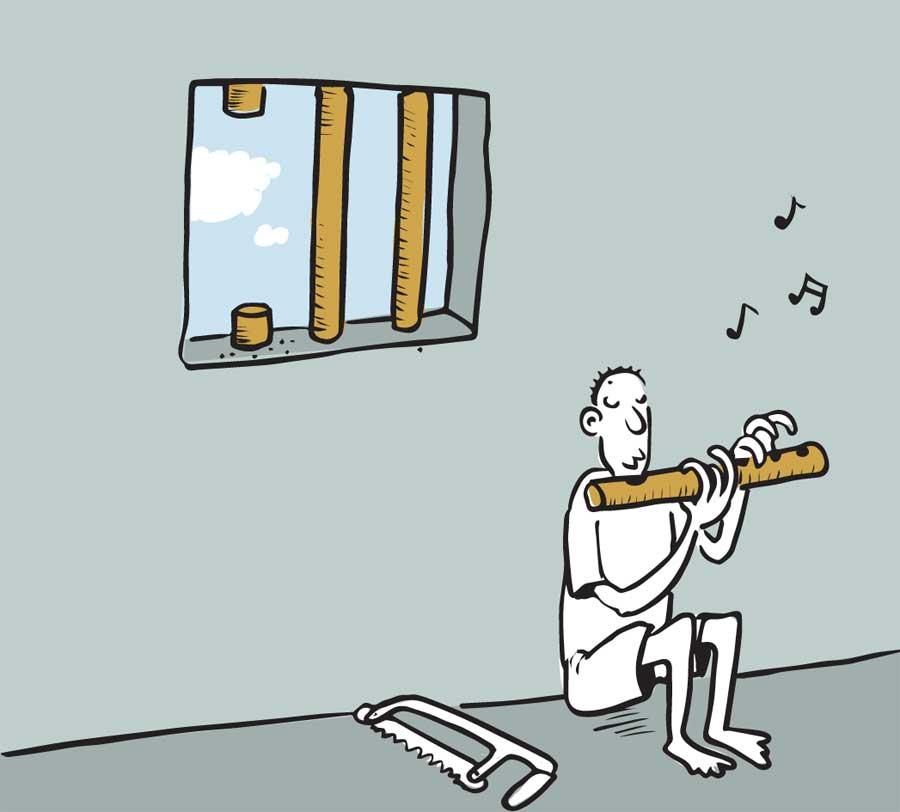Reply To:
Name - Reply Comment
Prisoners are also humans and that’s why some of them have received pardons when commemorating special days. Much has been written about inmates and their close associates. And these writers vouch that most of them have a soft side that others never knew existed.
On Vesak Poya Day as many as 260 prisoners were given Presidential Pardons. Out of them 53 were serving life sentences. From a legal perspective these prisoners also had to qualify to be pardoned. They would have been at their best behaviour.
There are other qualifications that inmates possess, but these don’t help them find a way out of prison. One such ability is to write heartwarming letters and most importantly poems.
Today’s editorial touches on the ‘Four hundred lakhs robbery’ in which the driver transporting the cash from the Turf Club in Cinnamon Gardens was killed and the cash stollen.
Four people stood convicted in the robbery plus murder and they were all sentenced to death. The man who masterminded the robbery was M.A.D James Senewiratne who later regretted his role in the crime. He wrote a letter to his family before being ordered to be sent to the gallows. He linked his downfall to associating with bad company. Senewiratne also wrote in the letter that he was a person with wisdom and had read up much from Buddhist books while in prison. He advised his children to practice Buddhism and to develop good character
Another person associated with this robbery that took place on January 30, 1949 was J.P Rajapaksa, AKA Wedamahattaya. He too penned a heartwarming note to his loved ones in which he asked forgiveness for his actions. Rajapaksa said that he accepted responsibility for all his faults.
Our lawmakers must visit these prison cells. They are like libraries and many of the walls bear some of the best poems and verses penned in human history. Former President Ranasinghe Premadasa once visited Welikada Prison. It was 1955 and Premadasa was a junior minister then and serving the St. Bastian constituency in Colombo.
Premadasa had spoken to an inmate by the name of Sirisena who was associated with a double murder at the Hapuwalana Dispensary along with two others. Premadasa was taken up by two poems penned by Sirisena; one dedicated to his mother and the other to his sister asking her not to grieve. Premadasa later penned a book regarding his prison visits and titled it ‘Athi Thathu’- which in English means ‘No Need of Explanations’.
A prison sentence is a time for reflection. Some come out as new people. Others don’t. Some who sin when in the outside world heavily regret past deeds when counting iron bars that strengthen prison cells. Many however don’t regret anything. One such criminal was Siripala (21) who was madly in love with a widower named Ranmenika who was 12 years his senior. But Siripala continued to nurture his hard side within. When Ranmenika came to visit him one last time and started crying he had said that he was ready for death anytime. However Siripala’s poems are cherished by those who read them. They carry his love for Ranmenika and her four daughters, Menike, Kumari, Rani and Seetha. This one by Siripala is touching:
Menike, Kumari, Rani and Seetha
Have these children grown up?
Before embracing death
Could you convey I inquired about them
Many who warm these prison cells pour out their sorrows in the form of poems. Some write about life, some about a past that must be erased. The most common topic for the majority of prisoners who scribble on walls has been their mother. That’s why one inmate, convicted for a crime that he had no involvement in, scribbled the following on the wall ‘My mother knows that I ain’t guilty’.
